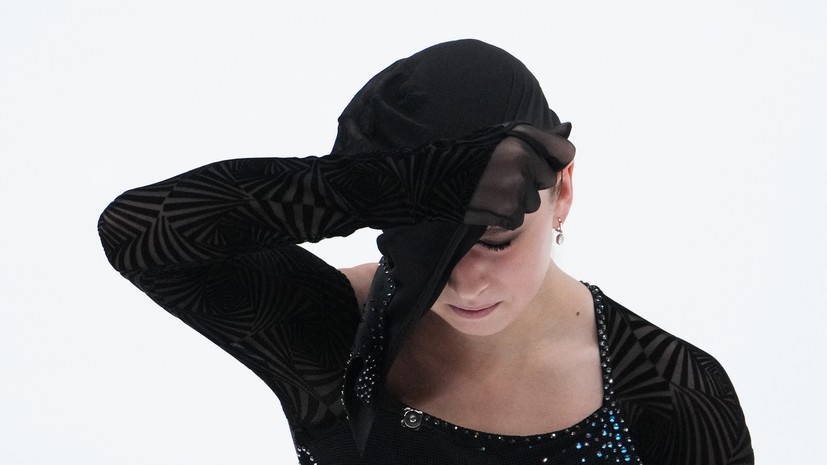She is much stronger than we all think about her.
At Megasport, at an event that is completely ordinary in terms of a sporting scale, we saw Kamila Valieva perform, perhaps the most outstanding of the women's skates of recent years.
Why such a cruel program towards the figure skater was staged is a completely different question, a separate one ...
After the girl, bursting into tears, left the ice, I called the psychologists I knew and asked the same question: what is the right step, knowing the background of the program, they consider such a production.
The answers were approximately the same: they say, yes, indeed, in psychology there is such a practice to make a person re-live a difficult situation for himself.
But, firstly, he must first be prepared for this, and, secondly, the process absolutely should not take place in front of the crowd.
Otherwise, such "therapy" can bring a completely opposite effect.
Camila did it.
At least that's what I really want to believe.
Her tears after the performance were actually a boon: much worse if the emotions had remained inside.
But I really want to talk about something else.
It's a paradox, but with a fairly large number of incredibly talented Russian single skaters who have gone through women's skating over the past few years, not one of the skaters has become truly great.
The phrase will surely cause a flurry of indignation in fan circles, so I’ll immediately explain: at the highest level of sports, where people fight for Olympic medals, victory in itself is a goal, and not at all valor.
Yes, the most outstanding or successful ones win, but sports greatness is still a slightly different status.
Of course, the criteria here are extremely subjective, but one can speculate.
Is Alyona Savchenko a great athlete who has completed five Olympics and won gold at the last of them at 36?
Undoubtedly.
What about Shizuka Arakawa, Oksana Baiul or Kristi Yamaguchi, each of whom won Olympic gold at different times?
More likely no than yes.
Although each of the skaters was unique in its own way.
Michelle Kwan or Irina Slutskaya could go down in history as greats, who fought among themselves, alternately winning world championship medals for ten years, climbed the podium at two Olympics, but both lacked a tiny touch for true greatness - an Olympic victory under the curtain.
If we recall the stars of recent generations, outstanding Russian champions, starting with Yulia Lipnitskaya, each of the careers ended in one way or another with understatement.
Could Evgenia Medvedeva and Alina Zagitova hold out in sports until the Beijing Games, fight for victory and achieve it?
Theoretically, probably yes.
But for various reasons it didn't work out.
Is Sasha Trusova, having lost the personal tournament in Beijing, able to realize her cherished dream of Olympic gold at the 2026 Games?
In February, I would not hesitate to answer this question in the affirmative.
Not now.
Because there is no certainty that Sasha is able to again drive herself into a very rigid working framework, and this is a prerequisite.
If he manages, he will get a chance to write his name in the great sports history: for now, Olympic silver and five quadruple jumps are not enough for this.
Valieva is a completely separate article.
The point here is not only in the cosmic, incomprehensible talent of Camila.
If you believe the statement that the universe never sends a test to a person that is beyond their power to endure, this 16-year-old girl is destined for a truly outstanding fate.
Her story is already full of drama, and it is quite possible, by the way, that bullying by the sports universe is not over at all.
But the way the athlete continues to carry this cross deserves respect and admiration.
That is why Valieva wants some outstanding, truly great story.
For example, a triumphant return with the award of a long-suffering team medal, and at least a personal Olympic victory in 2026.
From a sporting point of view, the goal is completely real: Camila was too far ahead of her own time to be afraid of competition from her rivals.
And the situation is unlikely to change in the next three years.
The main thing is not to loosen the nervous system and keep the desire to ride.
Valieva has everything else, including a completely unique quality: she always gives all her best, according to the absolute top bar, whether it's studying, training, or performing at competitions.
This, by the way, was perfectly visible at the box office: despite the fact that Valieva spent most of the summer in the show, grew up and became predictably heavier, she did not lose her technical condition at all.
Restoring quadruple jumps with such an attitude towards oneself is a matter of time.
To do this, you just need to lose weight and dry a little.
Could it be that the 2026 Games will be held without Russian athletes?
This question one way or another is now being asked by all representatives of winter sports.
Alas, such a prospect is not excluded, and this fact is quite capable of cutting off many careers altogether.
But even assuming that this can happen, for some reason I think that in the winter of 2030 Camila will be only 23 years old ...

